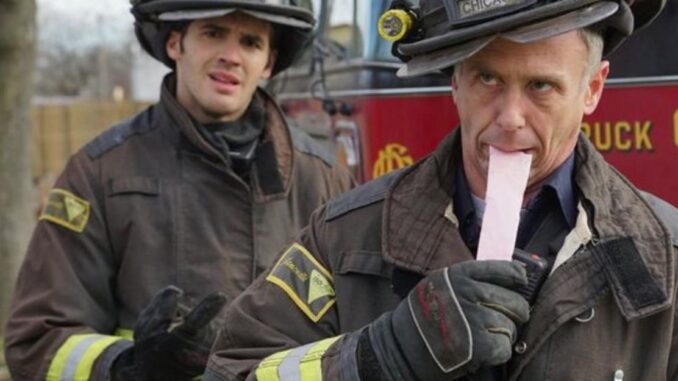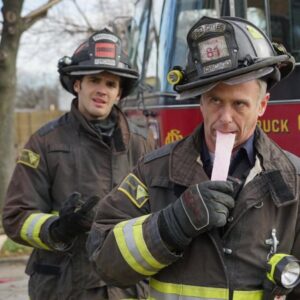
The Real Reason Why Herrmann Didn’t Take the Captain’s Exam in Chicago Fire
Chicago Fire has long been lauded for its gritty, authentic portrayal of firefighters and the unique bonds that form within the firehouse. One character who continually captures viewers’ hearts is Christopher Herrmann, a dedicated, down-to-earth firefighter with a strong sense of duty. So, when fans noticed Herrmann didn’t pursue the captain’s exam, many were left wondering why. In this article, we’ll explore the underlying reasons for his decision, shedding light on the show’s realistic depiction of firefighter culture and personal choices.

A Character-Driven Decision
Herrmann’s character has evolved significantly over the years. He’s known not just for his bravery but for his loyalty, sense of humor, and commitment to family. This article dives into the reasons, both subtle and explicit, that made Herrmann’s decision feel so true to life, focusing on the values he holds dear.
1. Understanding Herrmann’s Role in Chicago Fire
When we think of Herrmann, the image of a team player who always puts his crew first comes to mind. His dedication isn’t about seeking a title; it’s about standing by his team.
2. A Lifelong Firefighter, Not a Ladder-Climber
Unlike other characters who view promotion as a natural step, Herrmann shows us that some firefighters see leadership in a different way.
2.1. Herrmann’s Value System
Herrmann’s principles center around protecting his crew and maintaining the close-knit family within Firehouse 51. To him, a title isn’t necessary to lead.
3. The Personal Impact of Promotion
The show subtly hints at how a promotion might affect Herrmann’s ability to balance work and family. Given his deep love for his family, this potential disruption is something he’s unwilling to risk.
3.1. The Time Commitment
Becoming a captain requires dedication, time, and responsibility that could take him away from his family more than he’s comfortable with.
4. Reflecting Real Firefighter Culture
Herrmann’s choice reflects a genuine, often-overlooked perspective in firefighter culture: not everyone wants to climb the career ladder. Many are content with their roles, valuing their current position’s challenges and camaraderie.
4.1. Maintaining Strong Ties with His Team
As a longtime member of Firehouse 51, Herrmann has built strong bonds with his crew. A promotion might alter these relationships, potentially creating distance that could affect the unit’s dynamic.
5. A Tribute to Real-Life Firefighters
Herrmann’s decision honors those real-world firefighters who choose commitment to their team over titles. His character underscores that leadership isn’t confined to ranks but is about earning respect through actions.
6. Financial Stability Without the Promotion
One of Herrmann’s driving forces is his desire to provide for his family, which he achieves in various ways, including co-owning the bar, Molly’s. This added income allows him the financial freedom to stay in his current role without needing the extra pay a captain’s position might bring.
7. A Symbol of Loyalty and Brotherhood
Herrmann’s choice not to take the exam serves as a testament to his loyalty. He exemplifies how leadership can be about sacrifice and dedication, even if it means foregoing personal advancement.
8. Herrmann’s Leadership Style
Herrmann doesn’t need the title of captain to act as a mentor to younger firefighters. His guidance, advice, and fatherly presence shape the lives of his teammates, solidifying his leadership within Firehouse 51.
8.1. Mentorship Over Title
Herrmann’s informal mentoring resonates with his character, proving that titles aren’t necessary to make a difference.
9. The Emotional Weight of Command
Becoming a captain brings with it emotional challenges, including responsibility for team members’ lives. Herrmann, ever the empath, may have felt this was a burden too heavy to bear.
10. Community and Tradition Over Rank
Herrmann values tradition and camaraderie, often prioritizing his role as a supportive peer over hierarchical positions. This loyalty to his crew and his community stands out as his driving motivation.
11. Balancing Firehouse Duties with Molly’s
With his involvement in Molly’s, Herrmann is juggling both his work and his passion. Taking on more responsibilities at the firehouse could disrupt the balance he’s found.
12. The Importance of Stability
Firehouse 51 has seen its share of drama, and Herrmann’s steady presence is crucial to the team. His decision to remain in his role highlights his commitment to providing stability.
13. Audience Connection: Why We Relate to Herrmann’s Choice
Fans appreciate Herrmann because he’s relatable. His decision not to take the captain’s exam resonates with those who believe success isn’t always about titles but about personal fulfillment and loyalty.
14. What This Decision Says About Chicago Fire
The writers of Chicago Fire have consistently delivered authentic, character-driven narratives. Herrmann’s choice is another example of how the show brings genuine, human stories to life.
15. Herrmann’s Legacy Without a Title
Herrmann’s legacy within the firehouse is already cemented through his kindness, dedication, and unwavering support for his crew. By choosing not to take the captain’s exam, he demonstrates that his influence doesn’t require a title.
Conclusion
In Chicago Fire, Herrmann’s choice not to pursue the captain’s exam speaks volumes about his character. It’s a decision that goes beyond career ambition, rooted in his deep values of family, community, and loyalty to his team. Herrmann reminds us that success isn’t always about climbing the ladder but staying true to oneself and those around us. By reflecting the real-life decisions firefighters face, Chicago Fire has crafted a character whose motivations are not only realistic but deeply inspiring.
